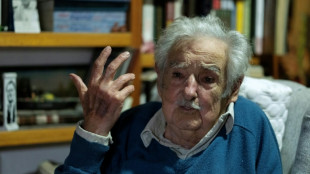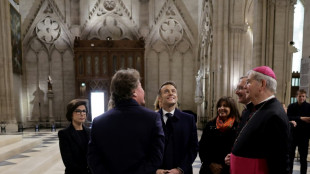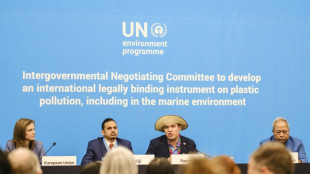
-
 Australia's Hazlewood out of 2nd India Test
Australia's Hazlewood out of 2nd India Test
-
Trudeau in Florida to meet Trump as tariff threats loom

-
 Jihadists, allies breach Syria's second city in lightning assault
Jihadists, allies breach Syria's second city in lightning assault
-
Trudeau in Florida to meet Trump as tariff threats loom: media

-
 Hunter shines as Hawks top Cavs again
Hunter shines as Hawks top Cavs again
-
Southampton denied shock Brighton win by dubious VAR call

-
 Alarm over high rate of HIV infections among young women, girls
Alarm over high rate of HIV infections among young women, girls
-
Swiss unveil Euro 2025 mascot Maddli

-
 Bears fire coach Eberflus after latest agonizing NFL defeat
Bears fire coach Eberflus after latest agonizing NFL defeat
-
Rallies mark one month since Spain's catastrophic floods

-
 Arnault family's Paris FC takeover completed
Arnault family's Paris FC takeover completed
-
Georgian police stage new crackdown on pro-EU protestors

-
 'We're messing up:' Uruguay icon Mujica on strongman rule in Latin America
'We're messing up:' Uruguay icon Mujica on strongman rule in Latin America
-
Liverpool dealt Konate injury blow

-
 Van Nistelrooy appointed Leicester manager
Van Nistelrooy appointed Leicester manager
-
Verstappen brought back to earth in Doha after F1 title party

-
 Global wine output to hit lowest level since 1961
Global wine output to hit lowest level since 1961
-
Norris boosts McLaren title hopes with sprint pole

-
 Big-hitting Stubbs takes satisfaction from grinding out Test century
Big-hitting Stubbs takes satisfaction from grinding out Test century
-
Romania recounts presidential ballots as parliamentary vote looms

-
 French skipper Dalin leads as Vendee Globe passes Cape of Good Hope
French skipper Dalin leads as Vendee Globe passes Cape of Good Hope
-
Chelsea not in Premier League title race, says Maresca

-
 Brazil's Bolsonaro aims to ride Trump wave back to office: WSJ
Brazil's Bolsonaro aims to ride Trump wave back to office: WSJ
-
France requests transfer of death row convict held in Indonesia: minister

-
 'Mamie Charge': Migrants find safe haven in Frenchwoman's garage
'Mamie Charge': Migrants find safe haven in Frenchwoman's garage
-
Iconic Uruguayan ex-leader hails country's swing left as 'farewell gift'

-
 Thousands rally in Georgia after violent police crackdown on pro-EU protesters
Thousands rally in Georgia after violent police crackdown on pro-EU protesters
-
Shared experiences make Murray 'perfect coach', says Djokovic

-
 Iran, Europeans to keep talking as tensions ratchet up
Iran, Europeans to keep talking as tensions ratchet up
-
Inflation-wary US consumers flock to 'Black Friday' deals

-
 France shows off restored Notre Dame after 'impossible' restoration
France shows off restored Notre Dame after 'impossible' restoration
-
South African bowlers strike after Sri Lanka set big target

-
 Namibia reopens polls after election chaos in ruling party test
Namibia reopens polls after election chaos in ruling party test
-
Georgia police arrest dozens in clashes with pro-EU protesters

-
 US stocks rise on Black Friday
US stocks rise on Black Friday
-
Leclerc on top for Ferrari in Qatar GP practice

-
 Jihadists, allies enter Syria's second city in lightning assault
Jihadists, allies enter Syria's second city in lightning assault
-
Amorim puts faith in Mount to turn around Man Utd career

-
 Guardiola will not 'run' from Man City rebuild
Guardiola will not 'run' from Man City rebuild
-
Assisted dying campaigners, opponents rally at UK parliament

-
 Durable prop Healy set to carve name in Irish rugby history
Durable prop Healy set to carve name in Irish rugby history
-
Macron unveils Notre Dame after 'impossible' restoration

-
 Traumatised Spain marks one month since catastrophic floods
Traumatised Spain marks one month since catastrophic floods
-
Yen rallies, euro up on rising inflation data

-
 Attack-minded Spurs boss Postecoglou says: 'You'll miss me when I'm gone'
Attack-minded Spurs boss Postecoglou says: 'You'll miss me when I'm gone'
-
Syria jihadists, allies shell major city Aleppo in shock offensive

-
 Macron inspects 'sublime' Notre Dame after reconstruction
Macron inspects 'sublime' Notre Dame after reconstruction
-
Arsenal must be near-perfect to catch Liverpool, says Arteta

-
 Arrests, intimidation stoke fear in Pakistan's politics
Arrests, intimidation stoke fear in Pakistan's politics
-
Showdown looms on plastic treaty days before deadline


Iran protests: What happened on Zahedan's 'Bloody Friday'?
Iranian security forces have massacred over 80 people in the southeastern city of Zahedan in Sistan-Baluchestan province, in a crackdown on protests that erupted as Iran is convulsed by nationwide demonstrations, rights activists charge.
President Ebrahim Raisi has ordered an investigation into the unrest that started on September 30 after Friday prayers, which officials have characterised as attacks by "extremists" on police stations.
Activists however say the horrifying images of bloodied corpses with bullet wounds are emblematic of Tehran's repressive polices towards a poor ethnic minority region.
- Where did the killings take place?
Zahedan is the main city of Sistan-Baluchestan, Iran's poorest region, on the border with Pakistan. Zahedan is one of Iran's few Sunni-majority cities and the region is populated by the Baluch ethnic minority who adhere to Sunni Islam rather than the Shiism predominant in Iran.
Activists have long complained the region has been the victim of discrimination by Iran's Shiite clerical leadership, with disproportionate numbers of Baluch killed in clashes every year and also hanged in executions.
The region has been the scene of attacks on the Iranian security forces that Tehran has blamed on Sunni extremist groups, while the border area is also seen as a hub for drug smuggling by armed gangs.
Amnesty International said that in 2021 at least 19 percent of all executions were of members of the Baluchi minority, who it said make up five percent of Iran's population.
"Killing Baluch does not cost much for the Iranian government," said Abdollah Aref, director of the UK-based Baluch Activists Campaign (BAC).
-What sparked the protests?
The unrest erupted two weeks into nationwide protests in Iran over the death of Mahsa Amini, who had been arrested by the notorious morality police.
However the trigger for the protests were accusations that a regional police chief had raped a 15-year-old-girl in custody in the port city of Chabahar, also in Sistan-Baluchestan. It is not clear why she was detained.
The accusation had been made public last month by the Friday prayer leader in the town of Rask south of Zahedan, prompting protests that then spread to the main city of the region.
-What was the chain of events?
According to Aref, a protest was planned after Friday prayers in Zahedan on September 30. Demonstrators then headed to the police station to protest the rape and also shouted slogans against supreme leader Ayatollah Ali Khamenei.
Amnesty said "a minority" of protesters threw stones at the police station. Security forces responded by firing "live ammunition, metal pellets and teargas", including from the roof of the police station.
The protests then spread across the city, targeting other police stations, said Aref. "The police sought to send a message," he added.
Internet monitor Netblocks reported access disruptions in Zahedan.
-How many people were killed?
According to Amnesty, 82 people have been killed, with 66 losing their lives on September 30 alone, including three children.
The protest "was bloodily suppressed by security forces. It has since been named Zahedan's 'Bloody Friday'," said Norway-based group Iran Human Rights (IHR).
Influential Sunni cleric Molavi Abdol Hamid charged that "a group of officers... opened fire Friday evening on a crowd that gathered around a mosque, killing and wounding multiple young people".
But state media has put the death toll from the events at 20, including six members of the security forces.
Aref said the death toll was accentuated by a shortage of blood and bandages, meaning many of the wounded died from their injuries.
He added: "Many did not go to hospital for fear of being arrested. They preferred home treatment but then lost a lot of blood."
Amnesty said that, according to its evidence, "the majority of victims were shot in the head, heart, neck and torso, revealing a clear intent to kill or seriously harm."
Iranian Foreign Minister Hossein Amir-Abdollahian on Wednesday blamed the violence in Zahedan and elsewhere in Iran on "foreign interventionists, organised agents and terrorists".
-What is the situation now?
Aref said the situation in Zahedan has calmed, although new protests were possible after weekly prayers this Friday.
But he added many people had been arrested in a clampdown on participants in the protests, although the precise figures were not clear.
Security forces used aerial drones and facial recognition technology to identify protesters and arrest them, he said.
Reports said that Taftan, the main border crossing east of Zahedan between Iran and Pakistan's Balochistan province, had been closed in the wake of the unrest.
Meanwhile executions of Baluch have continued. Four of five people who were hanged at the weekend in the prison in the city of Mashhad for drug related crimes were Baluch, IHR said.
Out of 251 people executed in Iran this year, 67 were Baluch, it said.
M.Odermatt--BTB
